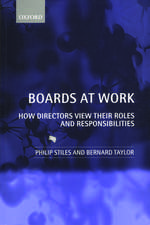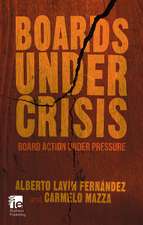The Role of Governance Structure in the Context of Crisis Management: An Empirical Analysis on a German Sample of Non-Family and Family Businesses
Autor Pedram Faghfourien Limba Engleză Paperback – 25 noi 2012
Based on empirical investigations, Pedram Faghfouri shows that non-family businesses are more likely to prepare for crisis when compared to family businesses. The author’s findings let further suggest that the existence of a supervisory board has a positive effect on the degree of crisis readiness of a family business. Moreover, in family businesses with supervisory boards, the involvement of family members in the top management team seems to have a negative effect on the degree of crisis readiness.
Preț: 381.21 lei
Nou
Puncte Express: 572
Preț estimativ în valută:
72.94€ • 76.17$ • 60.23£
72.94€ • 76.17$ • 60.23£
Carte tipărită la comandă
Livrare economică 15-29 aprilie
Preluare comenzi: 021 569.72.76
Specificații
ISBN-13: 9783658005955
ISBN-10: 3658005955
Pagini: 208
Ilustrații: XVII, 190 p. 18 illus.
Dimensiuni: 148 x 210 x 11 mm
Greutate: 0.25 kg
Ediția:2013
Editura: Springer Fachmedien Wiesbaden
Colecția Springer Gabler
Locul publicării:Wiesbaden, Germany
ISBN-10: 3658005955
Pagini: 208
Ilustrații: XVII, 190 p. 18 illus.
Dimensiuni: 148 x 210 x 11 mm
Greutate: 0.25 kg
Ediția:2013
Editura: Springer Fachmedien Wiesbaden
Colecția Springer Gabler
Locul publicării:Wiesbaden, Germany
Public țintă
ResearchCuprins
Turnaround Management – State of the Art.- Crisis management in family businesses.- Empirical studies: Methods and sample.- How family members in the TMT and the existence of supervisory boards affect EWSs in family businesses.- Differences in the crisis readiness of family and non-family businesses – does a supervisory board matter?.- Summary.
Notă biografică
Pedram Faghfouri has been a doctoral student at Germany‘s Wissenschaftliche Hochschule für Unternehmensführung (WHU) – Otto Beisheim School of Management. Today, he works as an Inhouse Consultant for a German DAX 30 automobile manufacturer.
Textul de pe ultima copertă
Both practitioners and scholars agree that organizations that are ready to cope with crisis should be better able to manage it than organizations which are not prepared. As, due to their company characteristics, family businesses are exposed to additional causes of crisis beyond the usual causes all companies face, preparing for crisis is of specific importance to them.
Based on empirical investigations, Pedram Faghfouri shows that non-family businesses are more likely to prepare for crisis when compared to family businesses. The author’s findings let further suggest that the existence of a supervisory board has a positive effect on the degree of crisis readiness of a family business. Moreover, in family businesses with supervisory boards, the involvement of family members in the top management team seems to have a negative effect on the degree of crisis readiness.
Contents
· Turnaround Management
· Crisis Management in Family Businesses
· Empirical Studies
· Effect of Family Members in the Top Management Team and the Existence of Supervisory Boards on Early Warning Systems
· Differences in the Crisis Readiness of Family and Non-Family Businesses
Target Groups
· Researchers and students in the field of Business Administration with focus on Strategic Management, Crisis Management or Family Businesses.
· Managers and experts with focus on Strategy, Crisis Management or Early Warning Systems both in non-family businesses and family businesses.
About the Author
Pedram Faghfouri has been a doctoral student at Germany‘s Wissenschaftliche Hochschule für Unternehmensführung (WHU) – Otto Beisheim School of Management. Today, he works as an Inhouse Consultant for German DAX 30 automobile and motorcycle manufacturer.
Based on empirical investigations, Pedram Faghfouri shows that non-family businesses are more likely to prepare for crisis when compared to family businesses. The author’s findings let further suggest that the existence of a supervisory board has a positive effect on the degree of crisis readiness of a family business. Moreover, in family businesses with supervisory boards, the involvement of family members in the top management team seems to have a negative effect on the degree of crisis readiness.
Contents
· Turnaround Management
· Crisis Management in Family Businesses
· Empirical Studies
· Effect of Family Members in the Top Management Team and the Existence of Supervisory Boards on Early Warning Systems
· Differences in the Crisis Readiness of Family and Non-Family Businesses
Target Groups
· Researchers and students in the field of Business Administration with focus on Strategic Management, Crisis Management or Family Businesses.
· Managers and experts with focus on Strategy, Crisis Management or Early Warning Systems both in non-family businesses and family businesses.
About the Author
Pedram Faghfouri has been a doctoral student at Germany‘s Wissenschaftliche Hochschule für Unternehmensführung (WHU) – Otto Beisheim School of Management. Today, he works as an Inhouse Consultant for German DAX 30 automobile and motorcycle manufacturer.
Caracteristici
Publication in the field of economic studies Includes supplementary material: sn.pub/extras












